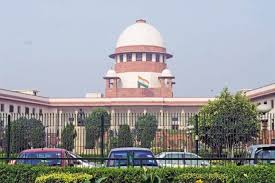While commuting the sentence of capital punishment to life imprisonment in respect of appellant – Sudesh Pal. (Para 1)
Armed with licensed guns, rifles and country-made pistols came from behind and started firing indiscriminately. As a result of the said firing, Satendra and Sunil fell down on ‘Khadanja’. When Masooq Ali s/o Abdul Gaffur came out of his house upon hearing the sound of gunfire, the accused persons shot fire at him due to which he also fell down. Following which, Ram Kishan and Sukhpal Singh (PW-2) ran away to save their lives. Ram Kishan thereafter entered into the house of the Up-Pradhan Rizwan (Para 2.3)
It is further stated in the FIR that the accused persons thereafter entered the house of Up-Pradhan Rizwan and fired shots at Ram Kishan, Rizwan and Rihan. They also fired shots at Sukhpal Singh (PW-2). Ram Kishan, Sunil and Satendra died on the spot. (Para 2.4)
At the conclusion of trial, the trial court vide judgment dated 31st July 2015 held the accused persons guilty of committing the murder of six persons and accordingly convicted the appellants (Para 2.19)
The High Court further confirmed the Death Reference insofar as appellant Madan is concerned; whereas insofar as appellant Sudesh Pal is concerned, his appeal was partly allowed and the sentence of capital punishment imposed on him was converted to life imprisonment. (Para 2.20)
The testimony of these witnesses is sought to be attacked on the ground that they are interested witnesses and there are inconsistencies in their evidence. (Para 37)
It can thus be seen that merely because some of the witnesses are interested or inimical witnesses, their evidence cannot be totally discarded. The only requirement is that their evidence has to be scrutinized with greater care and circumspection. (Para 39)
The next contention raised on behalf of the appellants is that the motive attributed by the prosecution is a very weak motive. (Para 44)
In totality of the circumstances, we are of the considered view that the prosecution has proved beyond reasonable doubt the case for conviction under Section 302 of IPC and the appeals in that regard are liable to be rejected. (Para 49)
The next questions that we are called upon to consider are, as to whether the present case falls in the category of rarest of rare cases, and as to whether on the facts of the present case, the capital punishment imposed on appellant- Madan deserves to be maintained or not? (Para 50)
No doubt that there is a history of previous conviction insofar as appellant Madan is concerned. However, this Court, in the case of Rajendra Pralhadrao Wasnik (supra), has held that the history of the convict by itself cannot be a ground for awarding him death penalty. (Para 72)
As discussed hereinabove, the appellant is of an advanced age. This Court, in the case of Babasaheb Maruti Kamble v. State of Maharashtra[(2019) 13 SCC 640], has held that advance age is one of the mitigating circumstances in favour of the convict. (Para 73)
This Court, in the case of Irappa Siddappa Murgannavar v. State of Karnataka[(2022) 2 SCC 801], has held that the period of incarceration while sitting in a death row is also one of the mitigating circumstances. In the present case, convict Madan has been incarcerated for a period of 18 years 3 months. (Para 74)
This Court, in the case of Mohinder Singh (supra), has held that the fact that the prisoner has displayed good behaviour in prison, certainly goes on to show that he is not beyond reform. (Para 75)
We find that the interest of justice would be met by converting death penalty into life imprisonment i.e. actual imprisonment for a period of 20 years without remission. (Para 77)
SUPREME COURT OF INDIA
2023 STPL(Web) 413 SC
[2023 INSC 990]
Madan Vs. State Of Uttar Pradesh
Criminal Appeal Nos. 1381-1382 Of 2017 With Criminal Appeal No. 1790 Of 2017 -Decided On 09-11-2023
https://stpllaw.in/wp-content/uploads/2023/11/2023-STPLWeb-413-SC.pdf







